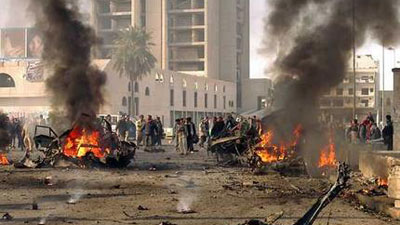U.S. State Terrorism: Boston vs Baghdad

Greater Boston and its citizens are the focus of media attention in recognition of the first anniversary of the Boston Marathon bombings that took three innocent lives and injured over 264 people, some of them severely. City leaders praised the heroism of the first responders and the deepened community spirit (“Boston Strong”). Addressing 2,500 invited Bostonians, including the bereaved families, Vice President Biden said “You have become the face of America’s resolve, not unlike what happened in 9/11…for the whole world to see. People know all about you. They know your pride, they know your courage, they know your resolve, they know who you are.”
There followed a procession down Boylston Street with bagpipers playing.
Meanwhile six thousand miles away in Iraq, there are terror bombings of innocent civilians almost every day. A sample:
On April 9, 2014, the New York Times reported that “The Iraqi capital, Baghdad, experienced a series of violent attacks on Wednesday when eight car bombs and two mortar shells killed as many as 25 people.”
On March 27, 2014, the Times reported that “A series of bombings in Baghdad killed at least 33 people and wounded dozens.” A 7 year old boy told his dad that he “had heard so many explosions that he could distinguish the different kinds of bombs.”
On March 9, 2014, the Times reported that a suicide bomber killed at least 45 people and wounded more than 100. A college student in the hospital remarked “my legs were no longer there.”
On March 6, 2014, the Times reported on bombings taking the lives of at least 30 shoppers and workers at public markets.
Such civilian deaths totaled 9,571 last year, according to the reliable group Iraq Body Count.
All this carnage, following the destruction of Iraq by George W. Bush and Dick Cheney, and the aftermath, is occurring in a country less than one twenty-third the size of the United States with less than one ninth the population, and far fewer emergency and hospital facilities.
And this bloodshed is happening almost every day over much of their torn apart country. Iraqis know this will continue to happen in the coming days and weeks with no foreseeable end. There is no annual commemoration to mark their losses. Their memories of loved ones are blurred by constant fear of what was and what comes, day after day due to violence, hunger, poverty, disease-bearing contaminated water, the collapse of critical public services from electricity to health care to safety. This has resulted in the flight of more desperate people out of Iraq.
Flash back to March 2003, when the fabrications, secret cover-ups and propaganda of the Bush/Cheney regime led to the illegal, unconstitutional invasion of Iraq. Under the tottering dictatorship of Washington’s former ally, Saddam Hussein, who presided over a poorly equipped army, unwilling and unable to fight, and was surrounded by three far more powerful neighbors should Hussein have made a menacing regional move. Iraq was no threat to the U.S., had no weapons of mass destruction, and was the mortal enemy of al-Qaeda.
Nonetheless, George W. Bush – of the self-styled “kick-ass” Bush clan – dispatched “shock and awe” against a defenseless population and replaced the dictator, Hussein, with brutal warfare, death squads and sectarian conflict, which has resulted in over a million lives lost, and millions of refugees (many of them children), amounting to a sociocide in that ancient land.
When President Bush’s chief anti-terrorism adviser, Richard Clarke, left the White House in 2003, he wrote in his memoirs that Mr. Bush’s invasion of Iraq was exactly what Osama bin Laden wanted to happen. Al-Qaeda did not have any presence in Iraq before the invasion, but the group is now wreaking havoc there, along with other affiliates in other countries due to Bush’s blundering. The U.S.’s empire-building both attacks and alienates local civilian populations, produces U.S. and foreign casualties and drains immense U.S. tax dollars needed here to rebuild our country.
History is cause and effect. Continuation of an Empire’s proclivity to wage war and regularly use force as a foreign policy will produce more far-reaching blowbacks. Waging peace, preventing conflict through diplomacy driven by justice – that great instrument of peace – has become an afterthought in Washington, D.C.
“Boston Strong” can be more than looking back on a tragedy with a stiff upper lip. It can nourish, from the cradle of the American Revolution, a rising sensitivity that tyranny abroad is a Washington export that defies our constitution and the better instincts of the people who stand against foreign wars for oil and an aggressive Empire unrelated to legitimate national defense.
Our collective compassion is helped by the development of fact-based empathy. That horrible tragedy at the Boston Marathon last year can lead to a constructive rapport with the Iraqi people who have suffered at the hands of the Bush/Cheney government and the lethal forces which the vicious invasion put in motion.

